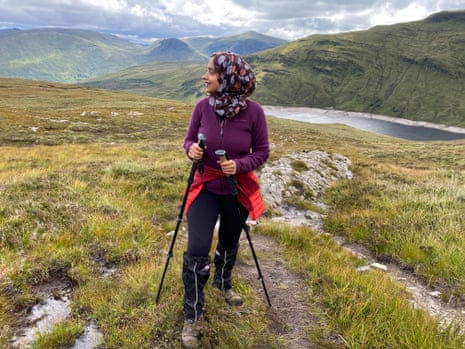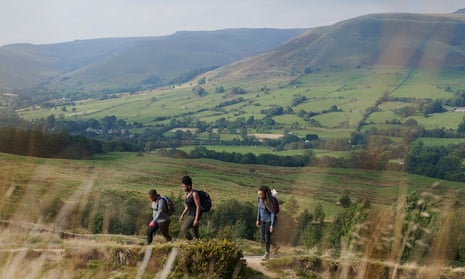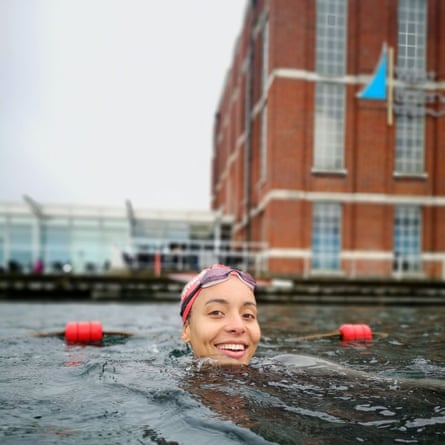The British countryside being the preserve of the white middle classes is a perception that is backed by stark figures, with ethnic minorities often deterred from heading into the outdoors due to deep-rooted, complex barriers.
At the time of the last census in 2011, 13% of the UK population, around 8.1 million people, identified themselves as black, Asian or minority ethnic (BAME). Yet a 2017 study by Natural England found that just 26.2% of black people spent time in the countryside, compared with 44.2% of white people.
According to a separate report, only 1% of visitors to UK national parks come from BAME backgrounds, and statistics from the outdoor sector paint a similar picture, with only around 1% of summer mountain leaders and rock-climbing instructors in the UK from ethnic minorities.
The reasons behind this reluctance to venture out are complicated. Recent Sport England research identifies six barriers to participation in outdoor activities for people from an ethnic minority background: language, awareness, safety, culture, confidence and perception of middle-class stigma.
Even more acute were the findings from a diversity review commissioned by the Department for Environment, Food and Rural Affairs (Defra). It highlighted that despite people from ethnic minority backgrounds valuing the natural environment and the slow and simple life of rural communities, they felt excluded and conspicuous in what they perceived as an “exclusively English environment”.
The report added: “Amongst people from ethnic minority backgrounds, the main factors restricting use of the countryside included the cost of visiting … and problems linked to transport, a lack of knowledge of the English countryside and a lack of ‘cultural habit’ of visiting … There was a fear of discrimination, as well as different patterns of use and a lack of culturally appropriate provisions.”
In June this year, the BBC show Countryfile looked at racial diversity and it was argued that a lack of access to the city for traditional countrysiders was the reason for the disconnection and perceived hostility to minorities. And, in October, one of the show’s presenters, Ellie Harrison, expressed fears about racism still being rife in the British countryside. Harrison, who has presented the show since 2009, raised concern about the amount of racism still taking place and explained that there was still “work to do”.
Over the past few years a number of groups and individuals have been working to address this imbalance, overcoming these barriers by encouraging others to venture out, as wells as urging leading outdoors brands to embrace diversity. The Guardian spoke with three women, hikers Zahrah Mahmood and Rhiane Fatinikun and wild swimmer Omie Dale, all of whom felt it was time to challenge the status quo and make the outdoors more inclusive, and at the same time help others from similar backgrounds see the benefits of what they could achieve when they ventured out.

The first time Mahmood hiked a Munro she found it so difficult she hung up her walking boots and vowed never to return. Five years later, she has climbed more than 30 Munros and has become an inspiration to Muslim women across the country – regularly featuring photographs on her Instagram page of climbing Scotland’s peaks in a traditional Muslim head-covering.
Mahmood took up hiking when a friend coaxed her on to Ben Lomond to reduce the stress of her chartered accountancy exams.
“I found that first hike so difficult. I struggled the whole way up and I could see people staring at me and I didn’t know if it was because I was wearing a hijab, my race or because I was clearly unfit – I imagine it was all three – but it was tough,” she said.
“I had never really exercised before that and to tackle a Munro straight off was just the worst. I struggled and complained … but there was something else, I was the only non-white person in a hijab on the entire walk and I just felt so out of place, so I decided to never return.”
However, Mahmood did return. Shortly after that first hike she joined a gym and embarked on a number of low-level flat walks, including the 26-mile Kiltwalk for charity, and now describes Glen Coe and the Lawers range, which takes in seven Munros, as her favourite places to hike.
“I realised that if I was stressed or struggling with something mentally, being outside and walking helped me. I was able to focus on getting to the end of the walk and I’d come back feeling refreshed – ready to tackle whatever was going on in my life.”
Mahmood, who regularly prays outdoors during hikes, reveals the challenges of being in the outdoors are not only physical ones. She is often stared at and has suffered racism.
“People look at me all the time and then sometimes I get comments. Often I just brush them off, but when it’s consistently pointed out to you that you don’t fit in, or when you don’t see other people like you, it does have an effect on you.”
“I am not like your normal white adventurer. Sometimes, prayer times fall during a walk so I might have to stop and pray, which can cause more unwanted attention and stares. It shouldn’t be something to be gawked at. While I mostly welcome questions, sometimes I just want to enjoy my time outdoors and switch off.”
Mahmood is now part of a growing movement in Britain that is seeing more people from BAME communities taking up hillwalking. Currently, she is collaborating with outdoor clothing and equipment brand Berghaus, and in the long term hopes to encourage more outdoor brands to embrace diversity.
“Posting a picture of a person of colour on your website or Instagram is performative if it’s not backed up by sustainable action. And, actually, it does more damage than good.”
“Some people may think this is encouraging, but there needs to be meaningful action behind it to back it up.”
Rhiane Fatinikun, 33, Bolton: founder of Black Girls Hike

In the middle of winter last year, Fatinikun was on a train travelling through the Peak District when she saw a group of hikers disembarking. She was fascinated, and decided almost immediately that she would give it a go – her new year resolution.
For her first walk, purchasing hiking boots and a waterproof jacket just the day before, the former civil servant went out with a group of friends on to the South Pennine Water Trail in Rochdale and she describes feeling relief, grateful to be outside and “doing something really physical”.
“These hikers on the train looked like they were about to go on an adventure and, just like that, on the spot, I decided to take it up. I’d been searching for something different for a while and felt like my life was passing me by. That first walk was just incredible,” she said.
As a child, Fatinikun, of Nigerian, Jamaican and English background, never ventured into the countryside but then a few years ago she had a car crash and began to suffer from anxiety.
“I needed something to help me overcome what happened but it wasn’t just the crash there was also this feeling that I wasn’t doing enough with my life and now I have overcome that. It has helped with my confidence in so many ways.”
Wanting to be sociable, Fatinikun decided to set up an Instagram page, Black Girls Hike, allowing others to join her on walks. The page has become a charity, and soon to be social enterprise, with support from sponsors including Berghaus, Lowe Alpine and Vivobarefoot, and Fatinikun has become an inspiration to many black and mixed-heritage women.
“Many people grow up in cities where they experience racism on a daily basis so it feels uncomfortable to them to head out into the countryside – the last bastions of whiteness – where it is even less diverse.”
“I wanted the group to be a space in which black women could feel safe and comfortable in the outdoors. It gives black women the confidence to go to places they might not have done before.”
Pre-pandemic, the group would meet twice a month with more than 500 people, from older women to those in their late teens having joined in. Since lockdown, Fatinikun has been going on solo hikes, often heading to Entwistle Reservoir near her home town of Bolton – one of her favourite walks. Now a qualified lowland leader herself, she has also been focusing on a future goal: helping to train more people from BAME backgrounds to become outdoor instructors.
“There are two things at play here: first, people need to know what they are doing in the outdoors to avoid getting lost, like we once did on Saddleworth Moor! But it is also important that those leading these hikes and activities are from a diverse background; that will stop making people feel like the countryside is not for them.”
Omie Dale, 23, south London: Black Swimming Association; Pride in Water volunteer

Whether it was plunging into the waters of the Nene valley near the Cambridgeshire village of Castor or diving into the sea on the Norfolk coast, Dale, spent much of her childhood swimming outdoors.
Her family rarely went on holiday abroad, instead collecting tokens from the Sun for cheap UK trips. On these UK breaks in “grubby holiday homes”, Dale remembers being encouraged, in particular, by her Gambian mother, to swim in the outdoors come “rain or shine”.
“My dad was a confident swimmer, but my mum wasn’t and so it was kind of non-negotiable – she didn’t want us to have the same anxieties as her, it was an activity we had to do whether in an outdoor pool, the sea or a lake – we would be in the water within minutes of arriving,” she said.
“Sometimes I didn’t even have a towel and I would just jump in. I have always found the water such a comfortable place to be.”
Now Dale is focusing on diversity in outdoor swimming, both on Instagram and through swim groups, particularly in collaboration with Mental Health Swims. She is also hoping to set up open water sessions in south London for all levels, including beginners, and trying to remove the barriers for those who would otherwise not swim. And as a volunteer for the Black Swimming Association, she has been exploring the issue of diversity in aquatics and the leisure industry.
“With swimming it is doubly difficult for people from BAME backgrounds, because you’ve already got the existing challenges of swimming itself, and then the unfounded stereotypes of black people not being able to swim.
“It can be overwhelming as a newbie, especially if no one looks like you on top of issues like water fear, cleanliness, knowing about currents – all of that makes it quite an exclusive activity.
“There are so many good things about swimming outside: it’s so beautiful and the mental health benefits are incredible, but there is a lot of work to do to get certain groups of people believing that it is something they can do and will enjoy.”





